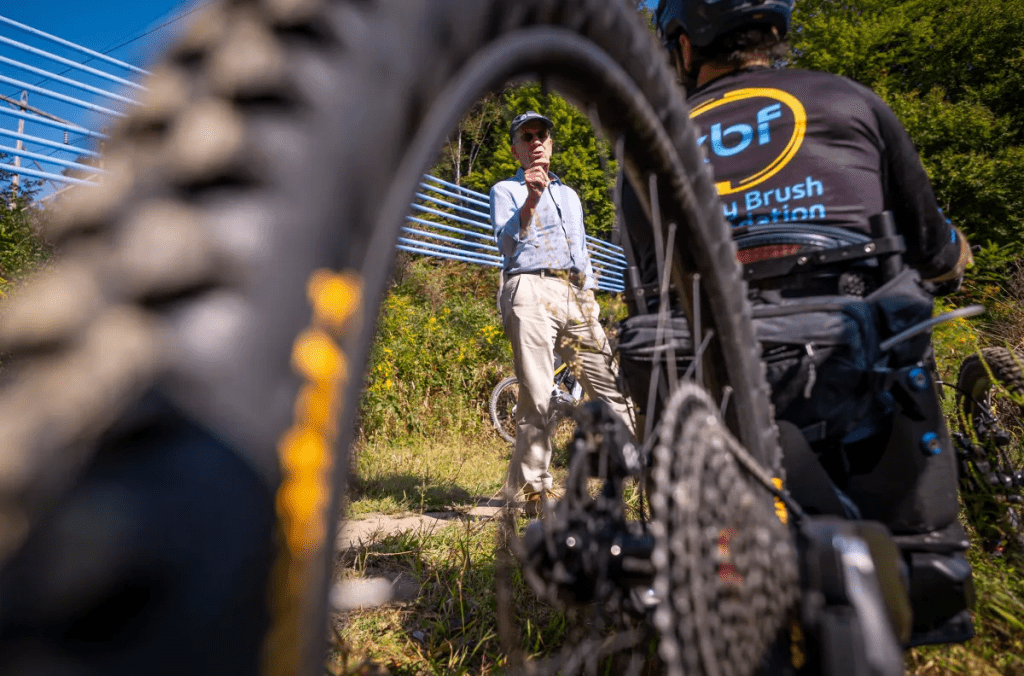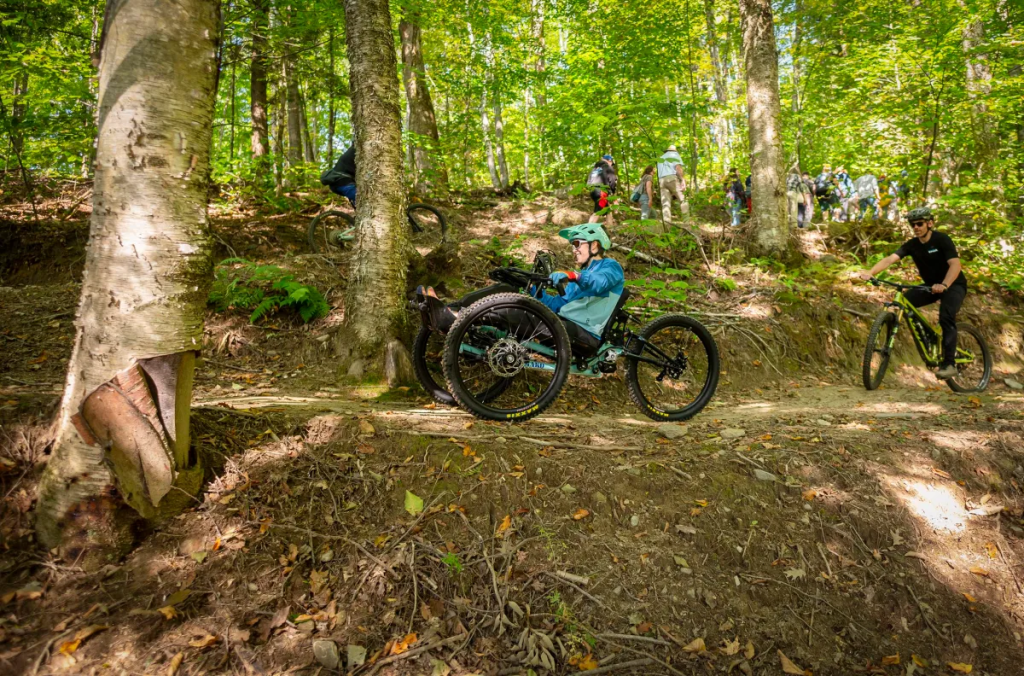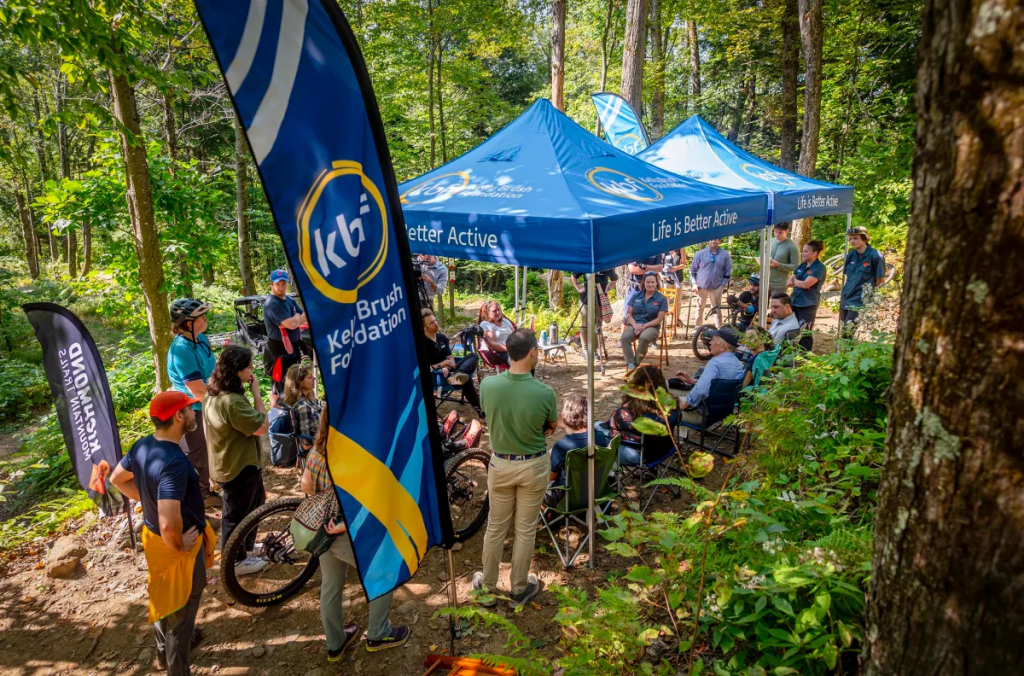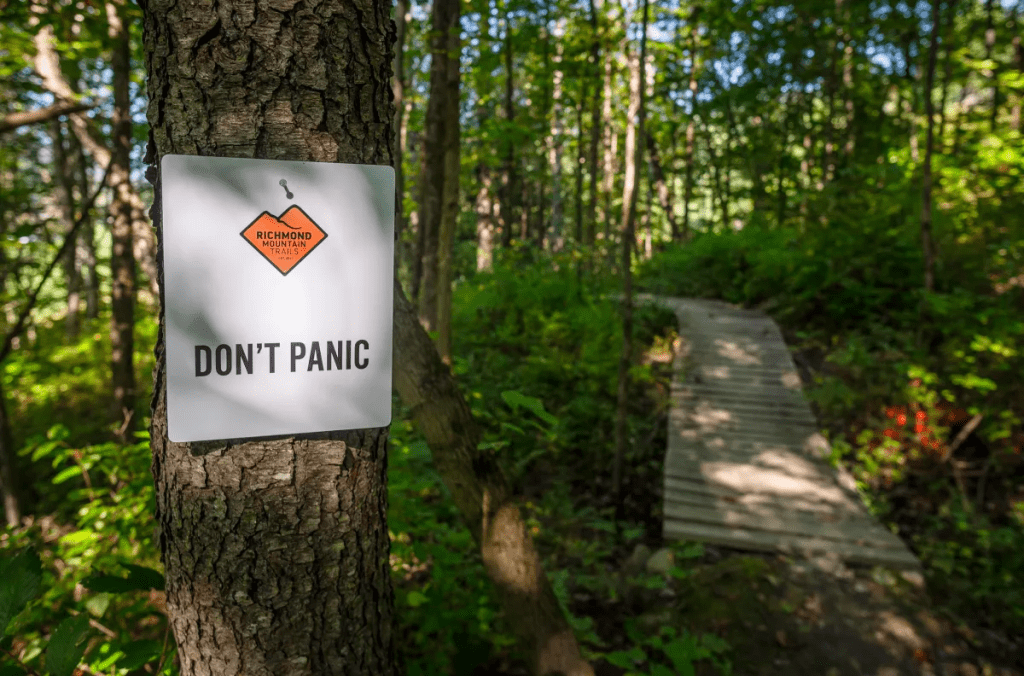The trail network is expected to make mountain biking more accessible to adaptive riders, and recreation and tourism leaders see a potential economic boost.

Photo by Glenn Russell/VTDigger
Mountain biking in Vermont should be more accessible to riders this fall, thanks to the first fully adaptive mountain bike trail network at the Richmond Mountain Trails in Bolton.
U.S. Sen. Peter Welch, D-Vt., met with local tourism and outdoor recreation leaders at the trail, called The Driving Range, on Friday morning to highlight and discuss their efforts to bolster the state’s outdoor and recreation economy.
“This is so astonishing to just be out to see this trail,” Welch told the group during a roundtable discussion at the top of one of the new paths.
Many mountain biking trails are not designed to accommodate adaptive mountain bikes, which are used by riders with disabilities or who do not ride a standard bike. Adaptive bikes, which typically have three wheels, are larger, wider and heavier than two-wheeled bikes, and work best with trails that have the width, corners, rollers and other features built to handle the bike, according to standards set by the Kootenay Adaptive Sport Association.
The Driving Range is different, participants said, because it was developed with adaptive biking needs top of mind. More than 5,000 hours of trail-building was completed by volunteers on 256 acres of private land. Work on the trail network began in 2022.

Photo by Glenn Russell/VTDigger
While about 10% of mountain biking trails in Vermont are adaptive, officials with Richmond Mountain Trails believe The Driving Range is the first network of adaptive trails in the world. That distinction is important, Richmond Mountain Trails board President Berne Broudy said, because it allows groups of adaptive and non-adaptive bikers to explore trails together.
“It introduces normalcy,” she said. “It removes a barrier.”
Adaptive, in this case, means the trails can accommodate adaptive mountain bikes, but they are not ADA accessible. However, there’s a false impression, bikers said on their way up the trail, that “accessible” means the trails are easy.
“That’s the stereotype we’re trying to break,” Greg Durso, adaptive biker and program director at the Kelly Brush Foundation, said to Welch. “In my eyes, they’re just trails.”
“It’s an eye-opener for me. I just didn’t have a sense of what it really meant to have an adaptive trail because this is, this is a hard trail,” Welch told participants at the top. “Nothing easy about it … hard, winding, steep, and I’m eager to see you go down.”
Kelly Brush started the Kelly Brush Foundation after injuring her spinal cord in a skiing accident 18 years ago. “Being active and sports were part of my identity, in the same way that being active is part of the identity of Vermont and all Vermonters,” she said.
For the first several years, the foundation primarily provided grants to help people with spinal cord injuries get the equipment they needed to get active, like adaptive bikes, mono-skis, and wheelchairs for tennis and basketball. But the equipment is not helpful without a place to use it, Brush said.
Brush’s focus at the foundation over the past several years has been to make recreational spaces more accessible.
“There’s no substitute to seeing the bikes on the trails. And really understanding what the bikes can do and what the limitations are,” Brush said. “The feedback that we almost always get is when you make the trails work for our bikes, they actually work better for everybody.”

Photo by Glenn Russell/VTDigger
Recreation and tourism leaders told Welch they believe the trail, and investment in similar efforts, will help drive more visitors to Vermont.
One in 10 jobs in the state depend on travel from tourism, according to Erik Hanson from the U.S. Travel Association. He said economic activity generated by those traveling to Vermont to experience outdoor recreation attractions will trickle down to businesses in retail, hospitality and agriculture.
“It’s really become something that Vermonters have attached to, but it’s also something that’s driving tourism through the state, too,” said Nick Bennette, executive director of the Vermont Mountain Bike Association.
Vermont tourism is a $3 billion industry, according to the state Agency of Commerce and Community Development. Outdoor recreation makes up 4.6% of the state’s GDP, second in the nation to Hawaii’s 5.6%, according to a 2022 report from the U.S. Bureau of Economic Analysis.
There are 13 million people who identify as having a disability living within a five-hour radius of Vermont, said Kim Jackson from Vermont Adaptive Ski & Sports.

“So there’s a huge opportunity for us to bring these folks to the state,” she said. “They come with their families, their friends, because at the end of the day, everybody wants to play together, regardless of your ability.”
But to build more outdoor recreation sites, organizations say they need more money.
“The gift and the burden of recreation is on volunteers in this state,” Broudy said. “We fought for every dollar that we raised for this project, and now that it’s done, we will fight to raise more money to maintain the trails, which is just as important as building them.”
“The documentation we’ve been getting is really creating an economic case about why it is a worthwhile infrastructure investment,” said Welch, a member of the U.S. Senate Commerce, Science and Transportation Committee.
But it’s about more than just the economic benefit, he added. Throughout the 45-minute conversation, Welch tied the trail network to the need for preventative health care measures.
“It’s the opportunity for people to be outdoors,” Welch said. “Exercise isn’t a bad medicine for the head and for the heart.”
Story Written by Catherine Hurley, VTDigger
